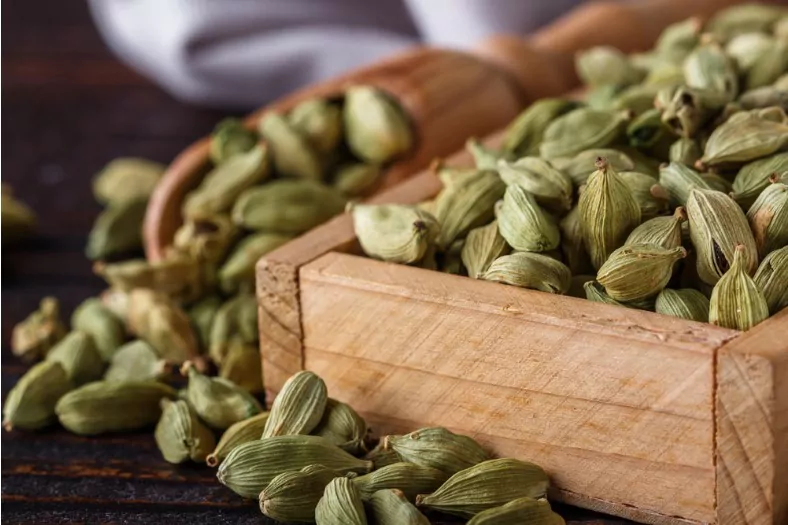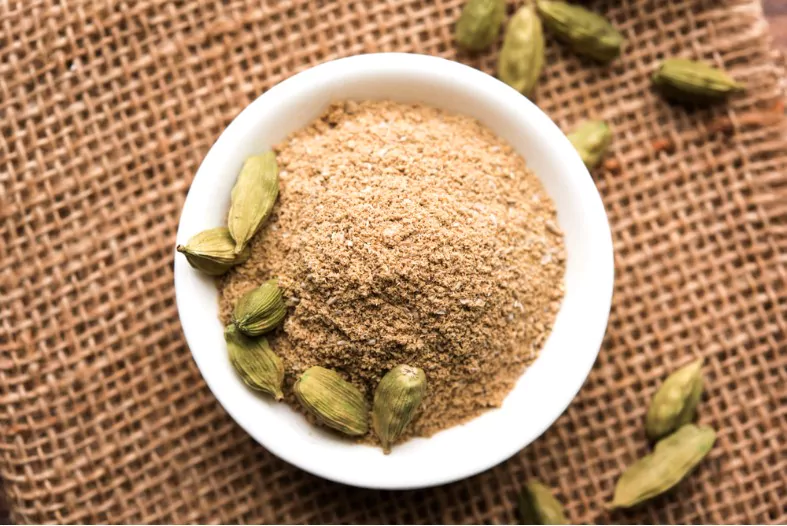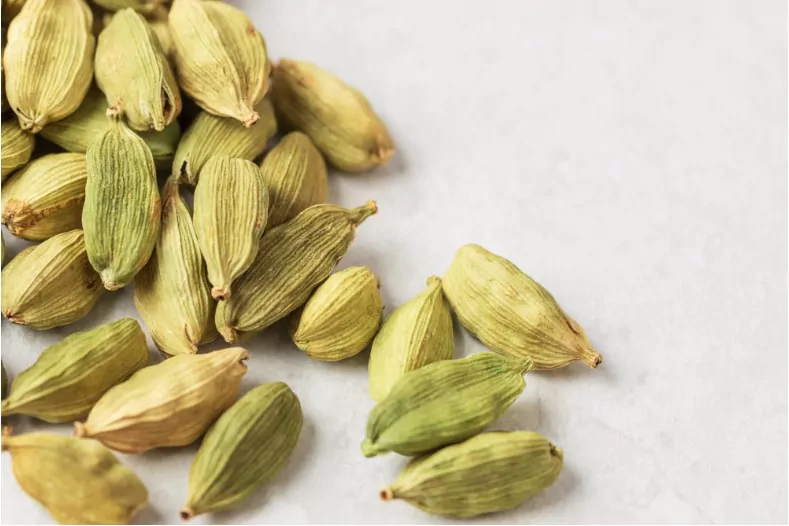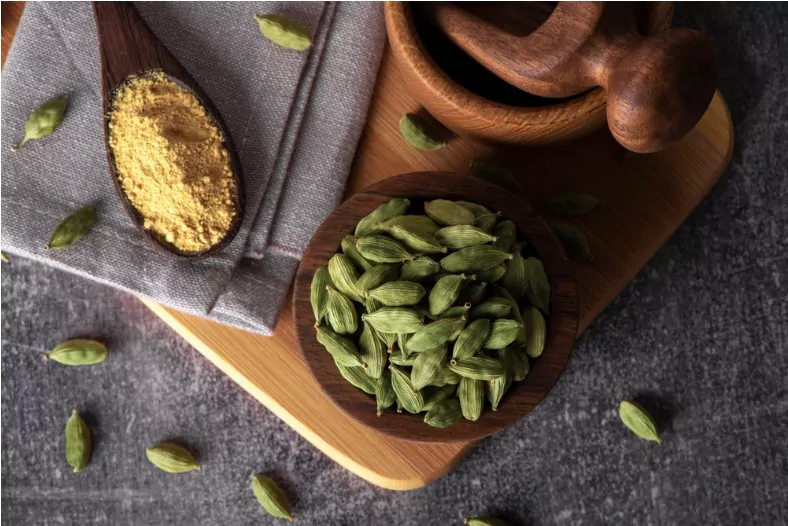Exploring Cardamom Benefits and Side Effects

Cardamom, a member of the ginger family, is a spice that boasts a long history in traditional medicine. Revered for its distinctive flavor and aroma, this aromatic spice has made its way into a myriad of sweet and savory dishes. From herbal teas to garam masala, its inclusion enhances food amounts with an unmistakable note.[1] But beyond its culinary appeal, what are the potential health benefits and side effects of cardamom? Let’s delve deep into the world of cardamom.
1 Cardamom At A Glance

Cardamom can be found in various forms, including:
- Whole cardamom pods: These are the seed pods which house the cardamom seeds.
- Cardamom seeds and ground cardamom: A concentrated form, often used in spice blends.
- Cardamom powder: Often used for both cardamom powder supplementation and culinary uses.
- Cardamom extract and cardamom oil: Extracted from cardamom seeds, they are used in herbal supplements and as essential oils.
- Green cardamom and black cardamom: The two most common types, each with its unique flavor profile.
2 Health Benefits of Cardamom Seed

Cardamom is renowned for its multiple health benefits, many of which have been substantiated with scientific evidence.
Oral Health
One of the most well-known benefits of cardamom is its ability to improve oral health. Known to treat bad breath and other oral health ailments, it’s a natural antimicrobial, helping to eliminate bacteria in the mouth. The antibacterial properties of cardamom essential oil, in particular, are highly regarded.
Digestive Health
In Ayurvedic medicine, cardamom has been used to treat digestive ailments for centuries. The spice is believed to alleviate stomach ulcers and gastrointestinal disorders, assisting with digestive health.
Blood Pressure Control
The diuretic properties of cardamom may help lower blood pressure. Consuming cardamom supplements or even adding cardamom to food in moderate amounts can potentially help regulate blood pressure levels.
Blood Sugar Control
Preliminary studies suggest that cardamom supplementation can help in blood sugar control, offering potential relief to those with metabolic syndrome or diabetes.
Anti-Inflammatory and Antioxidant Properties
Cardamom is rich in essential vitamins, including vitamin C. Its antioxidant properties can help fight cancer cells and possibly assist in cancer prevention. The cardamom essential oils and extracts have been especially touted for these benefits.
Liver Health
Some studies, including those conducted on Swiss albino mice, indicate that cardamom might protect against chemically induced liver inflammation and liver health issues.
Heart Health
Components within cardamom may promote heart health by improving cholesterol and supporting blood circulation.
Skin Health
The cardamom essential oil, when mixed with olive oil or other essential oils, can enhance skin complexion. Its antioxidant properties help in fighting free radicals, which are detrimental to the skin.
3 Side Effects and Considerations
Despite the many benefits of cardamom, it’s crucial to recognize the potential side effects.
Allergies
As with other spices, some people may be allergic to cardamom. It’s essential to be aware of any personal allergies before taking cardamom in any form.
Drug Interactions
Those on certain medications, especially for high blood pressure and blood sugar, should consult with their healthcare provider before adding cardamom supplements to their regimen.
Too Much Cardamom
Overconsumption can lead to digestive issues. It’s crucial to understand how much cardamom is appropriate for individual consumption.
Pregnancy and Breastfeeding
While cardamom is generally safe in food amounts, it’s advised to consult a doctor before taking cardamom supplements during pregnancy or breastfeeding.
4 Culinary Uses of Cardamom
Cardamom’s distinctive flavor has cemented its place in both sweet and savory dishes. From rich curries to fragrant rice and desserts, its versatility is undeniable. Essential oil extracted from cardamom is also used in recipes, often paired with olive oil to provide a unique flavor profile.
Apart from adding depth to dishes, it’s a crucial component of spice blends like garam masala. Furthermore, its inclusion in herbal teas, often alongside other spices from the ginger family, makes for a soothing beverage.

5 Storing Cardamom
To retain its medicinal properties and flavor, store cardamom in a cool, dry place. Whole cardamom pods have a longer shelf life than ground cardamom or cardamom powder.
6 Wrapping Up
Cardamom is more than just a spice that adds flavor to dishes. Its potential health benefits, ranging from oral health improvement to assisting with chronic diseases like high blood pressure and blood sugar control, make it a spice worth incorporating into daily life.
However, as with any herbal supplement or spice, moderation is key. Always be mindful of potential side effects and interactions, especially if considering cardamom supplementation.
Whether you’re sipping a cup of cardamom-infused herbal tea, relishing a savory dish, or exploring its health benefits, there’s no denying that cardamom holds a cherished place in culinary and medicinal traditions alike.
Community Q&A
References
-
1.
Gustavo R. Cárdenas Garza, Joel H. Elizondo Luévano, Aldo F. Bazaldúa Rodríguez, Abelardo Chávez Montes, Raymundo A. Pérez Hernández, Ameyalli J. Martínez Delgado, Sonia M. López Villarreal, José Rodríguez Rodríguez, Rosa M. Sánchez Casas, Uziel Castillo Velázquez, and Osvelia E. Rodríguez Luis: Benefits of Cardamom (Elettaria cardamomum (L.) Maton) and Turmeric (Curcuma longa L.) Extracts for Their Applications as Natural Anti-Inflammatory Adjuvants. - Retrieved on September 14, 2021
About This Article
This article has been viewed 232 times.



